Photographs: Reuters
Juan Antonio Samaranch will be remembered as the man who shaped the face of the modern Olympic movement, transforming it into a giant global enterprise that embodies both the best and worst elements of modern sport.
During his 21 years in charge of the International Olympic Committee (IOC), the Spaniard helped turn the summer Games from a white elephant which almost bankrupted the city of Montreal in 1976 in to a money-spinning bonanza that can still lay claim to being the greatest sporting show on earth.
Samaranch, who died in hospital at the age of 89 on Wednesday, steered the movement through two successive political boycotts which could have destroyed the Games and ushered it into the era of professional sport.
But Samaranch also presided over two decades during which the IOC suffered its biggest bribery scandal and when the lure of an Olympic gold medal persuaded many competitors to use potentially dangerous drugs in a bid to cheat their way to riches.
His critics contend that Samaranch's commercial achievements helped fuel the greed that led to the Salt Lake corruption scandal which exploded in late 1998 and argue that he failed to address adequately the growing menace of drugs in sport.
Succeeded Lord Killanin as IOC president in 1980
Image: Former International Olympic Committee chairman Juan Antonio Samaranch poses with medallists during the award ceremony for the women's double tennis final at the 15th Asian Games in Doha December 14, 2006Born in Barcelona on July 17, 1920, Samaranch pursued a career in sports politics in General Francisco Franco's fascist Spain.
He was Spanish chef de mission at three Olympic Games before winning a place on the IOC in 1966.
After Franco's death, Samaranch was appointed as ambassador to the Soviet Union where important contacts among third world sports officials helped him succeed Lord Killanin as IOC president in 1980.
FINANCIAL SUCCESS
Almost immediately Samaranch was confronted with a crisis which threatened the future of the Games with a US-led western boycott of the Moscow Olympics followed by an eastern bloc retaliation in 1984 at Los Angeles.
Los Angeles not only provided a spectacular show, it was also a financial success and represented a clear break with the past with its focal sport of athletics now fully professional.
The 1992 Barcelona Games, held in Samaranch's birthplace, were a stunning success as corporate sponsors queued to join the party and the price of television rights soared.
Samaranch showed political skill in a difficult period
Image: Former IOC chief Juan Antonio Samaranch attends the Spanish 2016 Olympic bid reception in Copenhagen September 30, 2009Boycotts were over and all seemed well in the Olympic movement, but there were mutterings of bribes to IOC members in the now fiercely competitive bids to host the winter and summer Games.
Allegations of drugs cover-ups also persisted. The Ben Johnson drugs scandal, when the Canadian sprinter tested positive after winning the 1988 Seoul Olympic 100 metres final shocked the world.
A subsequent Canadian government inquiry found evidence that doping was widespread in athletics.
In 1994 Samaranch declared: "Chinese sport is very clean," on the eve of the Asian Games. Six weeks later news leaked out that world 400 metres freestyle champion Yang Aihua had tested positive. A further 10 Chinese positives were revealed.
A series of high-profile drug busts including the Festina scandal at the 1998 Tour de France prompted the International Olympic Committee to call a special anti-doping conference at its Lausanne headquarters in early 1999 and to establish the World Anti-doping Agency (WADA).
SCANDAL
WADA's first president Dick Pound, who had played an important role in turning the Olympics into a profitable concern, said before ending his tenure that Samaranch had shown little interest in the battle against the use of drugs in sport.
He won a vote of confidence from IOC members with ease
Image: Spain's Juan Antonio Samaranch, Honorary President for Life of the International Olympic Committee, attends a tennis match on central court during the 2005 French Open at Roland Garros stadiumAnother scandal struck when veteran IOC member Marc Hodler, who had run against Samaranch for the presidency, told reporters some members had been bribed to award the 2002 Winter Games to Salt Lake City.
The allegations were confirmed and, to their horror, IOC members found themselves international pariahs enduring stinging attacks from politicians and the world's media.
The IOC was accused of not stamping down soon enough on the excessive free trips of members and Samaranch faced calls to quit from the media at the height of the Salt Lake scandal.
Visits to candidate cities were later banned but Samaranch still won a vote of confidence from IOC members with ease.
He saved the Olympic Games from destruction
Image: President of the International Olympic Committee (IOC), Juan Antonio Samaranch, browses the official web site of the Sydney 2000 Olympic Games during a visit to the Technology Command Centre, September 26, 2000. Samaranch returned to Australia following the recent death of his wifeIn response, the IOC instituted internal reforms, including bans on visits to bidding cities, while 10 members either resigned or were expelled.
The final decisions made during Samaranch's tenure were the decision to award Beijing the right to stage the 2008 Olympics despite widespread criticism of China's human rights record and the election of his chosen successor Jacques Rogge as the new IOC president.
Samaranch's supporters believe he saved the Olympic Games from destruction and demonstrated subtle political skills in a difficult time.
His critics argue that many of the original ideals were obscured in the search for commercial success.

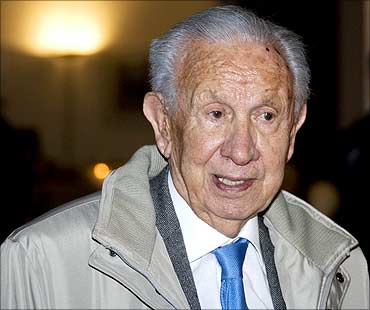
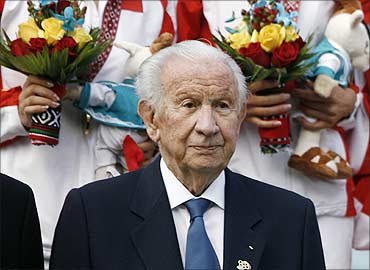
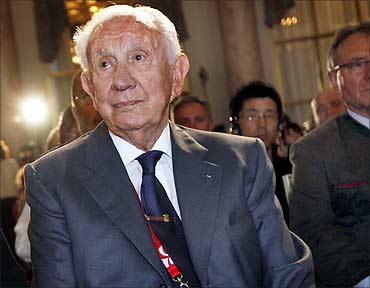
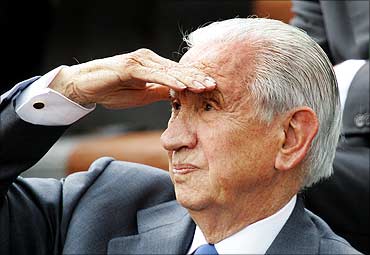
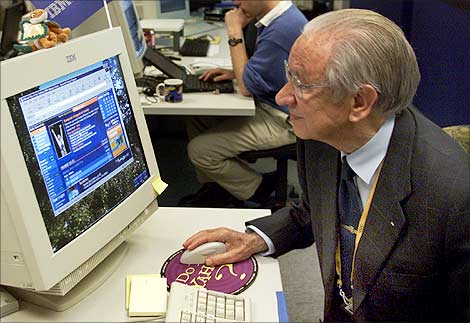

Comment
article